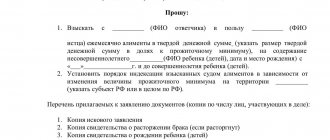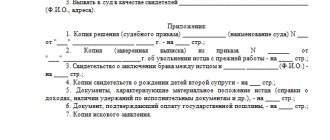We will not go into detail about the nuances of divorce and the specifics of the procedure for collecting alimony. We have already talked about this several times. This article will mostly focus on the procedural side of the matter. You will learn which courts to file which claims, whether it is possible to file a claim for divorce and alimony at the same time, and whether alimony depends on the moment of termination of the marital relationship.
Is it possible to file for divorce and alimony at the same time?
It is possible to dissolve a marriage and collect alimony at the same time, but to do this you will have to go to a district or city court. Previously, it was possible to apply to the magistrates' court , but now the rules have changed.
What is important to consider:
- The guardianship authority is involved in any disputes about children. His representative gives an opinion on the case.
- You can collect alimony not only for a minor, but also for a child over 18 years of age, as well as for the spouse with whom he remains. But strictly in certain cases.
- If the defendant objects to the separation, the court may give up to three months for reconciliation (Article 22 of the RF IC). This will significantly increase the duration of the divorce process. But if the plaintiff continues to insist on divorce after the reconciliation period, the decision will be made in his favor.
Note! If you need to get a divorce quickly, and both parties agree to this, it is easier to first apply to the magistrates' court for a divorce. In this case, a decision will be made in a month. Then you can collect alimony, but through the district.
The legislative framework
| Title of the legal act | Articles |
| Family Code of Russia |
|
| Civil Procedure Code of Russia |
|
| Tax Code of Russia (part 2) |
|
Features of alimony collection
Child support is collected for the period from the moment the application is submitted until the child reaches the age of majority. The plaintiff chooses the form of payment, but the final decision remains with the court.
Alimony is collected in several forms:
- As a share of salary. For one child 1/4 is paid, for two children - 1/3, for three or more - 1/2. The total amount of deductions cannot exceed 50% of the payer’s earnings. 70% is withheld by court decision if additional payments are collected for the mother on maternity leave, or if there is a child support debt.
- In a fixed amount of money (hereinafter referred to as TDS). The size is determined taking into account the financial situation of the spouses and the interests of the child. The PM in the region in which he lives is also taken into account. Collection is possible if the payer does not have a job or it is not possible to determine the exact level of his income.
- In a mixed form. This is relevant if the payer has a main and additional income: for example, an official salary and earnings from renting out an apartment. Alimony is withheld from wages in shares, from additional income - in TDS.
TDS is determined taking into account the cost of living. For example, a parent with whom a minor is staying can recover 0.5, 1, 2 or 3 monthly payments, depending on the situation.
Important! In February 2021, citizens had the opportunity to collect alimony for additional expenses for renting housing by a parent raising a child from a parent living separately. Payments are collected in a fixed monetary amount (TDS) and depend on the amount that is given as payment to the lessor.
Arbitrage practice
The case was considered by the Alushta City Court of the Republic of Crimea in June 2015.
The wife sent a statement to the court in which she asked:
- Dissolve the marriage with the defendant, change the surname to the premarital one.
- Oblige the husband to pay monthly alimony contributions for the common child until he reaches 18 years of age.
- Ensure your own maintenance at the expense of your husband until their common child turns 3 years old.
The wife motivated her claims as follows:
- It makes no sense to continue the marriage relationship, since the married couple has actually broken up, does not live together and is not involved in running a common household.
- The husband does not want to resolve the issue of alimony by mutual agreement.
- Her own maintenance is necessary because she is busy caring for the baby. Because of this, she has no time to work.
The defendant, in response to the plaintiff’s claims, stated that he agreed to separate from his wife, but would not give her money, since she would spend it on herself. Instead, he proposed this option: he would independently purchase everything necessary for the baby. He also explained that he works in a taxi company, so his earnings are irregular.
Having considered the circumstances of the case, the court came to the following conclusions:
- It is necessary to end the family relationship of the spouses, since this does not contradict their wishes and the law.
- Partially acknowledge the wife's demands regarding child support. Since the income of taxi drivers is unstable, the payment of alimony obligations should be awarded in a fixed amount. Reduce the amount of alimony claims from 6 thousand rubles. up to 4.5 thousand rubles.
- The defendant should be required to pay his ex-wife 2 thousand rubles monthly. on its content. Since the husband’s family financially supports the plaintiff, for example, clothes and feeds her child, pays for her studies at the university, the judge came to the conclusion that there are no reasons to award a larger sum of money than 2 thousand rubles. for financial support of the spouse.
Alimony for a spouse or ex-spouse
If a woman is on maternity leave for up to three years, her husband or ex-husband will have to pay alimony for her maintenance. They are installed in a fixed size.
You can also recover payments for your own maintenance in other situations:
- If a woman is pregnant.
- If the second spouse is caring for a common disabled child, or an adult common disabled child since childhood, group I.
In some cases, alimony is immediately collected for children and wife even after a divorce. For example, if she is pregnant, caring for a disabled child, declared incapacitated during marriage or within one year after its dissolution (Article 90 of the RF IC).
Is there any point in filing an application if people lived in a civil marriage?
The term “civil marriage” is not legal, since traditionally any non-church marriage was called civil. But in colloquial speech, a civil marriage often refers to an actual marriage relationship without concluding an official union. In this understanding, civil marriage is a fairly common phenomenon, and such couples also have children. It’s not a problem if people lived in a civil marriage, but it’s much more difficult when they have a child and can’t come to an agreement.
In this case, you can file a claim for alimony when:
- The fact of paternity is recognized by the defendant.
- Life together continues, but the man refuses to support a common-law family.
- The parents did not live together, but the woman has a child from a man and needs financial support. If the defendant does not want to admit paternity, he will need to prove this by undergoing a medical examination.
The procedure is the same as in the case of divorce and filing for alimony at the same time. The only thing you need to do is indicate that the couple was not married. If a man initially refused to acknowledge paternity, then alimony will be awarded only if his paternity can be proven in court. The main arguments in such cases are the results of DNA testing.
Features of divorce
A marriage can be dissolved through the court, regardless of the consent of the defendant. But if he objects, the time frame for consideration of the case may be delayed. When going to court, the marriage is considered dissolved from the moment the decision enters into legal force (Article 25 of the RF IC).
When considering a case, the court pays attention to several points:
- Reasons for divorce. It is not necessary to indicate them in the application, but if the defendant objects, the judge will definitely ask them.
- Who do the children stay with? This issue is resolved regardless of whether a request to determine their place of residence is submitted or not.
- The defendant's opinion. If he is against it and files a petition to set a conciliation period, he will have to wait up to three months for a decision.
In addition, during the divorce process it is possible to resolve the issue of division of property, but this will complicate everything and may increase the time for consideration of the case.
Is it possible to file a claim through a representative?
When divorcing through the registry office, there is no need for a representative, since his role can be played by the second spouse. It’s just that instead of a general statement, he will have to file two separate claims written on his behalf and on behalf of the absent spouse. In turn, a spouse who is unable to be present at the registry office in person must complete the following steps:
- fill out an application;
- have it certified by a notary office;
- submit the application to the registry office through the spouse, who will submit it simultaneously with his own.
If spouses dissolve their marriage in court, the law allows them to send a proxy in their place, whose powers will be confirmed by a trust document issued in his name. When drawing up such a document, it is necessary to confirm all the powers necessary to conduct the trial, these include:
- Completing and submitting an application.
- Permission to collect the necessary documents.
- Participation in court hearings.
- Appealing a court decision.
Important! The power of attorney must be certified by a notary.
Is it possible to deprive parental rights?
Often, parents with whom children remain want to deprive their former spouses of parental rights. This is done in order to receive alimony, but at the same time prohibit communication with the child. In the future, the deprived parent will not be able to collect alimony from his adult son or daughter for his own maintenance.
But you can’t just deprive your rights; you need grounds (Article 69 of the RF IC):
- Abuse of parental rights.
- Chronic drug addiction or alcoholism.
- Child abuse.
- Committing a crime against the life and health of a child, or his mother or father.
- Malicious evasion of payment of alimony, fulfillment of parental obligations.
Not only a representative of the guardianship authority, but also the prosecutor’s office participates in the deprivation case.
Related documents
- Statement of claim for divorce and division of property
- Statement of claim for divorce
- Statement of claim to determine the order of communication with a child
- Statement of claim to determine the amount of alimony in a fixed amount of money
- Statement of claim for termination of the contract with the travel agency and compensation for moral damage
- Statement of claim against the consumer service for reimbursement of the cost of the damaged item and compensation for moral damage
- Statement of claim for a refund or replacement of goods, and compensation for moral damages
- Complaint to the store for replacement of goods
- Claim to the household service for reimbursement of the cost of a damaged item
- Claim for a proportionate reduction in the cost of a tourist package
- Claim for inflated tariffs for maintenance and repairs including VAT
- Statement of claim for recovery of property from someone else's illegal possession
- Claim regarding delay in eliminating the defect of goods and demand for compensation for moral damage
- Claim requesting termination of the sales contract and return of the cost of the phone
- Claim for restoration of the period of acceptance of inheritance
- Claim to the bank for a refund of fees for issuing a loan and insurance
- Statement of claim for the return of the loan fee
- Statement of claim for collection of rent arrears
- Statement of claim for reinstatement at work, recovery of wages for forced absence, compensation for moral damage
- Appeal (short)
Divorce through court and collection of alimony: step-by-step instructions
Divorce proceedings with the collection of alimony for child support take place according to the rules of the Investigative Committee, the Code of Civil Procedure and the Civil Code of the Russian Federation.
How everything looks step by step:
- The plaintiff draws up a statement of claim, collects documents, and sends a copy of the statement to the defendant.
- Documents are submitted to the court. The judge accepts them for proceedings within 5 days.
- A date for the preliminary hearing is set and the parties receive notice.
- At the preliminary meeting, requirements are clarified and missing documents are requested.
- A main hearing is scheduled. It can be held on the same day as the preliminary one.
As a general rule, cases of alimony are considered for up to one month (Article 154 of the Code of Civil Procedure of the Russian Federation). But if a demand for divorce is filed at the same time, it will take up to two months.
After consideration of the case on the merits and debate between the parties, a decision is made. It comes into force after 30 days. After the specified period, former spouses can come to the registry office for divorce certificates; they are issued on the day of application.
How to properly file a claim in court
It is currently not possible to file a claim through State Services, but you can use your account on the State Automated System “Justice” portal to go to court online. Some send documents by Russian Post, through representatives, or bring them in person.
Now about which court to go to. Cases regarding the collection of alimony are heard only by city or district courts. In the world court you can only submit documents for divorce.
Sample statement of claim for divorce and alimony
The statement of claim states:
- name, address of the court;
- Full name, residential address, passport details, telephone number of the plaintiff;
- Full name, place of residence, passport details (preferably) of the defendant;
- information about the child;
- date of marriage, document details;
- demands: to collect alimony, to dissolve the marriage;
- the amount of alimony collected;
- details of the bank account to which the defendant will transfer money for the child;
- inventory of submitted documents;
- signature and date of preparation.
Documents and state duty
According to Art. 333.19 of the Tax Code of the Russian Federation, when going to court, 600 rubles are paid - the state fee for divorce. For the collection of alimony - 150 rubles, but the plaintiff does not pay this amount, it is collected from the defendant.
In addition to the application, you will need a passport, a marriage certificate, a child’s birth certificate, and a receipt for payment of the state fee.
Contents of the statement
According to Russian legislation, filling out a statement of claim must be carried out according to the template established by regulations. Any claim document contains three semantic parts:
- The upper part or, in other words, the “cap”. It contains the following information:
- The name of the judicial authority to which the applicant is sending his claims.
- Personal information about the plaintiff, including his last name, middle name and first name, contact information, for example, telephone, email, and his residential address.
- Personal information about the defendant, including his last name, middle name and first name, contact information, for example, telephone, email, and his residential address.
- Descriptive and motivational part. It states:
- Information about the time and place of the official marriage of the defendant and the plaintiff.
- Availability of children and details of documents confirming the fact of their birth.
- Reasons why spouses want to end their family relationship.
- There are disagreements about the future fate of the children. For example, this may be the disagreement of one of the participants in the marriage to leave the child with the other parent, a dispute over the future place of residence of the children, or a demand for deprivation of parental rights.
- The existence of an agreement between parents on the issue of child support for young children. If it is absent, then the plaintiff must indicate which of the spouses will be the alimony provider, and how much money he will be required to transfer monthly for the maintenance of young children.
An indication of the legal norms on the basis of which the plaintiff makes his claims.- Resolution part. It contains the following data:
- A list of demands presented, for example, dissolution of the marital relationship, change of surname and forcing the ex-spouse to pay alimony.
- List of documents and evidence attached to the application.
- The date the document was written with the signature of the originator.
What obstacles may arise
It may take a minimum of time to consider the case and make a court decision. This happens when the spouses were able to agree. Let's look at how you can file for divorce and alimony at the same time to avoid delaying the process.
The most common situations when difficulties may arise:
- One of the spouses refuses to give a divorce. This problem is quite common. If you have a firm intention to divorce, it is better not to waste time trying to get the consent of the second spouse, but to immediately go to court.
- The plaintiff does not know where the other party is. First, you can still try to find the defendant, so that in the future you will be able to present evidence that it was not possible to find the husband/wife. Witnesses can be a local police officer or neighbors.
- The parties have no desire to see each other. In this case, the husband or wife can be replaced by a representative. To do this, it is enough to fill out a petition and draw up a notarized power of attorney in the name of the representative, in which you need to indicate in what issues he will represent you and what statements he has the right to make on your behalf.
The application is quite simple to complete. You do not need to have a legal education to do this. Help will only be needed in situations where it is impossible to reach an agreement with the defendant.








